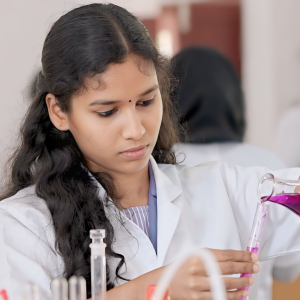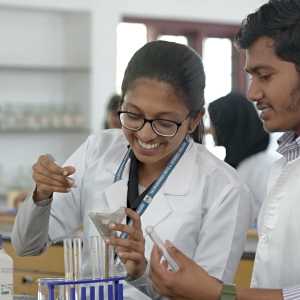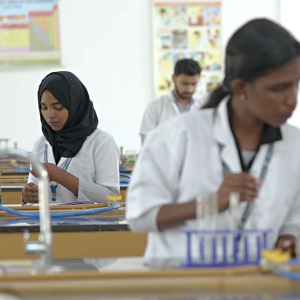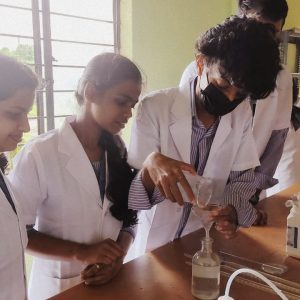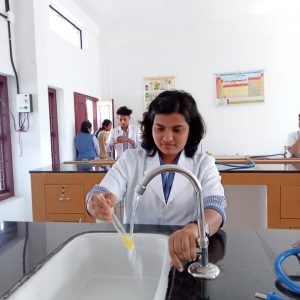A well-equipped and neat chemistry lab is available for students. The lab is designed to be used by 40 students at a time.
Laboratory Safety Rules Guidelines
The following safety rules must be followed at all times in the laboratory. The chemical laboratory is not necessarily a dangerous place. Intelligent precautions and a proper understanding of techniques to be followed make the chemistry laboratory no more dangerous than any other classroom.
- Safety goggles (department approved) must be worn in the lab at all times. Glasses and contact lenses are not acceptable eye protection. Students who do not follow this rule will be asked to leave the lab immediately.
- Never eat or drink in the lab. Food may pick up toxic chemicals.
- Never inhale fumes or vapors. Use fume hoods for dangerous or irritating chemicals. Always waft odors toward your nose with your hand.
- Never taste any chemical. Some chemicals are very corrosive and poisonous in very small quantities.
- Never perform an unauthorized experiment and never work in the lab without an instructor in charge. An accident may happen when mixing simple chemicals.
- Never remove anything (chemicals, glassware, etc.) from the lab. It is illegal !
- Label all containers to identify their contents.
- Never put anything back into a reagent bottle. Once a reagent has passed the mouth of its container, it has passed the point of no return. Always take as little of a chemical as possible. Use only clean, dry spatulas for removing chemicals from bottles. Properly dispose of excess chemicals.
- Leave chemicals in their proper place. Do not carry original containers of chemicals to your benchtop.
- Avoid touching hot objects. Burns are a common accident in the chemistry lab. Be careful when using hot plates and objects which have been heated on them. Use beaker tongs to remove hot containers from the hot plate.
- Rinse spills off skin immediately. Rinse off any chemicals spilled on the skin immediately with large amounts of water.
- Clean up broken glassware immediately. Place it in the labeled crock at the front of the lab. Obtain replacement glassware from the instructor.
- Properly dispose of waste chemicals. Certain liquids can be poured into the sink and flushed with water while others are poured into designated waste containers. Most solid wastes are placed in designated crocks. Your instructor will provide disposal instructions each lab.
- Notify your instructor immediately of all accidents.
- Learn to locate and operate (if applicable), the safety shower, fire extinguisher, eye-wash fountain, fire blanket, and fire exit.
Lab Procedures
The following are procedures that must be followed for all lab sessions. Many are safety issues as well.
- Dress properly for lab. Wear clothing that covers as much skin as possible. Sandals are not permitted. If possible, wear older clothes on lab day. All loose clothing and long hair must be confined.
- Read the entire experiment before coming to lab. The instructor will briefly discuss the experiment at the beginning of each lab.
- Arrive on time for lab. If a student arrives late for lab and misses a substantial portion of the introductory discussion and safety precautions, the student may be a threat to themselves and others in the lab. The instructor may deny the student the privilege of completing the assigned experiment.
- Work independently unless otherwise instructed.
- Keep the benchtop uncluttered. Only those personal items pertinent to the lab work (lab manual, etc.) are to be on the benchtop at a students work station. Book bags, coats, etc. are not to be placed on the benchtop or on the floor close to the lab benches. Place all such items in the designated areas near the entrance to the lab.
- Keep drawers closed. Drawers and cabinets are to be kept closed except when items are being taken from or returned to these drawers.
- Take only planned breaks. If the need arises to take a short break, you may do so at any time during the experiment with these points in mind; try to plan the break during a less critical time in the experiment (e.g. while something is cooling); make sure that your hot plate is turned off; inform a neighbor and the instructor.
- Do not come to lab under the influence of drugs. If, in the judgement of the instructor, a student presents a safety hazard to himself or his fellow students because the student is affected by medication, alcohol or other factors, the instructor may refuse to allow the student to continue working in the lab that day. If the situation is noted more than once, the student may be permanently removed from the course.
- Clean up at the end of lab. At the end of all lab sessions return clean glassware to your drawer, clean your benchtop and finally wash your hands thoroughly. Be sure all electrical devices and water are turned off.

